
Maria Luisa Spaziani was an Italian poet.

Donna Leon is the American author of a series of crime novels set in Venice, Italy, featuring the fictional hero Commissario Guido Brunetti. The novels are written in English, and have been translated into many foreign languages, although – at Leon's request – not into Italian, as she formerly lived there, still visits monthly, and prefers not to have recognition in the country.

Luísa Rosa de Aguiar Todi was a popular and successful Portuguese mezzo-soprano opera singer.
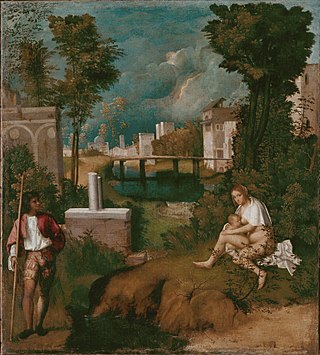
The Tempest is a Renaissance painting by the Italian master Giorgione dated between 1506 and 1508. Originally commissioned by the Venetian noble Gabriele Vendramin, the painting is now in the Gallerie dell'Accademia of Venice, Italy. Despite considerable discussion by art historians, the meaning of the scene remains elusive.

Luisa Miller is an opera in three acts by Giuseppe Verdi to an Italian libretto by Salvadore Cammarano, based on the play Kabale und Liebe by the German dramatist Friedrich von Schiller.

Luisa, Marchesa Casati Stampa di Soncino, was an Italian heiress, muse, and patroness of the arts in early 20th-century Europe.

Nine is a musical initiated by and with music and lyrics by Maury Yeston and a book by Arthur Kopit. It is based on the 1963 film 8½.
Linda Lappin is an American-born poet, novelist, and translator living in Rome, Italy.

Luisa Ranieri is an Italian actress. She has been seen in a number of miniseries on RAI and has appeared in numerous films, including 2004's Eros and 2021's The Hand of God.
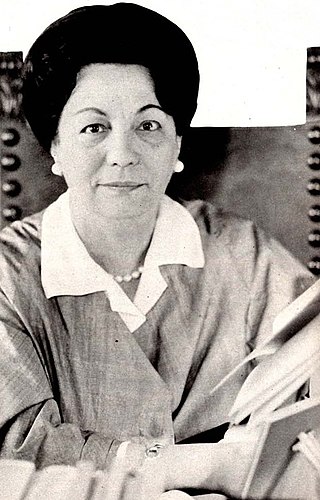
Maria Villavecchia Bellonci was an Italian writer, historian and journalist, known especially for her biography of Lucrezia Borgia. She and Guido Alberti established the Strega Prize in 1947.
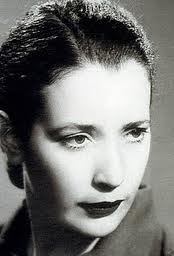
Anna Maria Ortese was an Italian author of novels, short stories, poetry, and travel writing. Born in Rome, she grew up between southern Italy and Tripoli, with her formal education ending at age thirteen. Her first book, Angelici dolori, was issued in 1937. In 1953 her third collection, Il mare non bagna Napoli, won the coveted Viareggio Prize; thereafter, Ortese's stories, novels, and journalism received many of the most distinguished Italian literary awards, including the Strega and the Fiuggi. Although she lived for many years in Naples following the Second World War, she also resided in Milan, in Rome, and for most of the last twenty years of her life in Rapallo. L'iguana, Ortese’s best-known work in English translation, was published in 1987 as The Iguana by the American literary press McPherson & Company. As of 2023, what she considered as her most important work, the novel Il porto di Toledo (1975), had not been translated into English yet.
Malisa Longo is an Italian actress, model and writer.
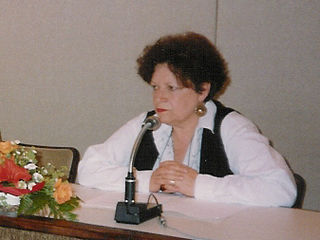
Luisa Futoransky is an Argentine writer, scholar and journalist living in France.
Catherine M. Sama is a professor of Italian at the University of Rhode Island. Her research focuses on Early Modern and 18th-Century Italian Women Writers, Correspondence Networks, The Italian Enlightenment, Italian Women Artists, and Gender Studies. In 2013 she was a recipient of the National Endowment for the Humanities Research Fellowship. She also serves as a board member of the URI Center for the Humanities. She has edited the work and written a biography of the 18th-century Italian writer Elisabetta Caminèr Turra.

Anne-Marie Fiquet du Boccage, née Le Page, was an 18th-century French writer, poet, and playwright.

Luisa Pérez de Zambrana was a Cuban writer and translator. She was one of Cuba's greatest poets.
Laura Mancinelli was an Italian writer, Germanist, medievalist and university professor.

Anna Luisa Pignatelli della Leonessa dei Principi di Monteroduni is an Italian novelist and an aristocrat of German ancestry.
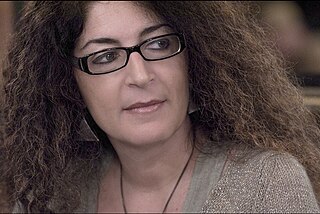
Melania Gaia Mazzucco is an Italian author. She is a recipient of the Strega Prize and Bagutta Prize.
Bergalli is a surname. Notable people with the surname include:















